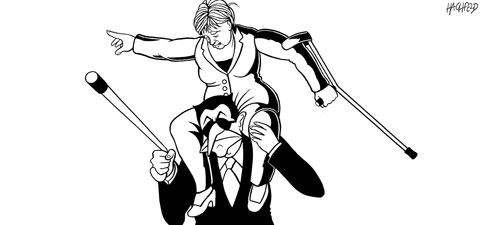Recently we have heard repeated the encouragement often passed down the corridors of power in Western countries: "Never waste a good crisis,” uttered by Hillary Clinton to the European Parliament in 2009. But that requires a certain political militancy, and one of the aspects at the heart of the current malaise is that it's precisely that fighting spirit that is sorely lacking. And so we read editorials like the one in the most recent issueof The Economist: “The debt crisis has been running for 18 months now, and the only way that euro-zone leaders have dazzled is through sheer incompetence.”
This contemptuous judgement is, in my opinion, a little too glib. Certainly, European leaders have not scored many points. But the question is whether this arises primarily from their own personal shortcomings or from the political atmosphere in which they are supposed to act, which has become much more rebellious and offers less flexibility than it did some decades ago. Does Angela Merkel have lesser qualities than Helmut Schmidt or Helmut Kohl? Does Nicolas Sarkozy have less of his heart in the job than François Mitterrand or Jacques Chirac?
Former leaders are often romanticised
There is no doubt that Obama, just like the duo of “Mer-kozy”, has made mistakes. And perhaps that Sarkozy is not quite of the stature of a Mitterrand, that Merkel doesn't punch at Kohl's weight, and that Obama lacks the political ingenuity of a Bill Clinton. But the performances of former leaders often take on a rosy glow over time. Moreover, the political room for manoeuvre has become narrower almost everywhere.
This is explained by one fundamental cause: the erosion of state power. The political scientist Alfred van Staden in 2008 compared the freedom of movement of a head of government today to that of a motorist stuck in traffic: "He is master of his own driving and sometimes manages to sneak on through, but the traffic flow is largely determined by how other drivers behave on the road and by the traffic rules.” Even the United States is stuck in traffic, though many Republicans still believe they are living in a time when, as an American, one could drive wherever one wanted without having to stop.
A second force is the cause of the slowdown: the political schism that has become a general phenomenon. In many countries, coalitions are trying painfully to exercise power and society is highly polarised. Policy successes are quickly forgotten in such a climate. Suffice it to mention the political vicissitudes that Sarkozy has faced. The president of France has widely been praised for his bold intervention in putting together an alliance against the regime of Muammar Gaddafi, but he has seen little benefit from that at home.
More power to Brussels
The conclusion to be drawn is unfortunately not very encouraging, especially for Europe: political disintegration will not vanish as if by magic. Perhaps we should place our hope not in better political leaders, but in more mature public opinion. For therein lies the main obstacle: Euroscepticism, though understandable, has led to a widespread mistrust of virtually all forms of power. Yet without power and without acceptance of that power exercised by a partner - the EU - that we have chosen ourselves, we are doomed to get bogged down.
The classic federalist answer is to hand over more power to Brussels. In recent months, though, the intergovernmental approach has resurfaced. Specifically, the aim is to give the lead role to Berlin, with Paris as the first link. Another lesson to be drawn from the current woes is that if a federal Europe will in future play a bigger role once more, it would be better that the European Commission be headed by a person from a country with a triple-A ranking rather than by one from a country in crisis that needs a great deal of propping up.
Ireland
Irish PM fears another EU referendum
German chancellor Angela Merkel’s drive to make changes to the Lisbon Treaty in order to assert control over the eurozone debt crisis could have serious consequences in Ireland. As the Irish Times reports, the Merkel initiative could “require a referendum in Ireland.” According to the Irish constitution, any changes to EU treaties must be submitted to the electorate. For the Dublin daily this “is likely to create political difficulty for Taoiseach Enda Kenny, who has made it clear in recent days that he does not want to reopen the pact.” The Taoiseach would be no doubt keen to avoid a repeat of the 2008 Lisbon Treaty referendum which the Irish electorate rejected, only to approve it in 2009, after the EU pressured the government to hold a second vote. What changes Chancellor Merkel intends to implement to the treaty are far from clear however. Officials expect that they “would be designed to make it easier for the European authorities to impose their will on the economic policy of countries which consistently breach EU budget rules.”
Was this article useful? If so we are delighted!
It is freely available because we believe that the right to free and independent information is essential for democracy. But this right is not guaranteed forever, and independence comes at a cost. We need your support in order to continue publishing independent, multilingual news for all Europeans.
Discover our subscription offers and their exclusive benefits and become a member of our community now!












